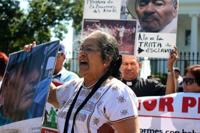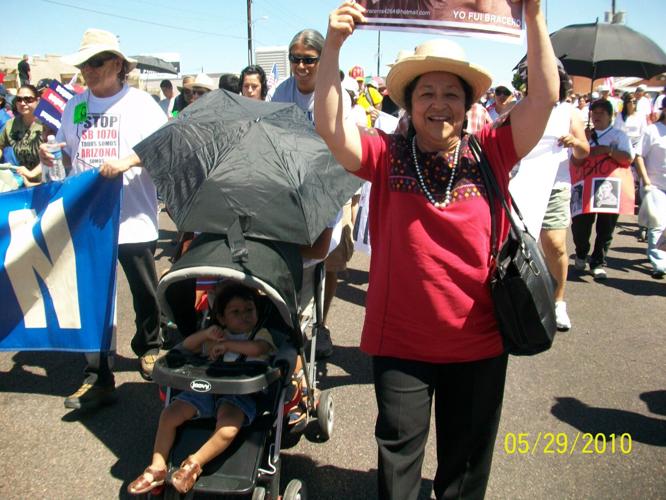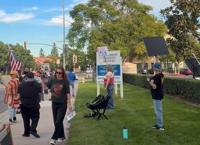
The story of organizer and immigrant advocate Rosa Martha Zarate Macias is one of courage, rebellion against oppressive systems and profound pride in her Mexican heritage as a commanding force for collective change.
Zarate was born in Guadalajara, Jalisco into a family that is committed to social justice. Her father, a railroad station manager, played an active role in resisting the privatization of Mexico's railroads. He also fought for labor rights when the owner of a sugar cane mill in Ameca, Jalisco failed to pay the farmers. Leading a strike that brought the mill to a halt for a month, he refused personal compensation to end the boycott, insisting instead on fair payment for all the workers.
Her grandmother bravely participated in defending Catholic priests from execution by the Mexican government during the Cristero War, sheltering them in water wells to keep them safe. “She risked her life to defend her beliefs […] I say that we all have to drink from our own well and know how to identify the people who have influenced our lives and our values, and above all, who have marked our social practice,” said the advocate in Spanish.
At the age of 15, she began working as a secretary at a school for low-income boys that her father had helped establish in Ameca. It was there that she discovered the power of community fundraising. Some children struggled to pay their tuition and the school's priest needed funds to cover salaries. To assist, she visited the families of the students, urging them to contribute whatever they could—whether it was a chicken, eggs or fruit. These items were then taken to the local grocery store to be sold and the proceeds were used to support the school. This experience would go on to shape her future advocacy work.
“I began to see how I managed to get funds here and there,” said Zarate.
She arrived in the U.S. in 1966 as a religious Sister and a kindergarten teacher at a Catholic school. One day, a man organizing a farm workers' protest at the Civic Center of San Ysidro, California visited the school and invited her to play her guitar at the event to “motivate the people.” She immediately accepted the request, but her superiors opposed her participation.

Rosa Martha Zárate Macías at an immigration march in Arizona.
The power of her voice
Zarate questioned, "How is it possible that, as Catholics, as people of faith, as Mexicans, as teachers, we cannot take a moment to stand with these individuals in their fight for justice?" Her words were inspiring, and she was granted the opportunity to join the workers and the man who had invited her. That man was César Chávez.
As she sang “Indio,” her voice filled the room, carrying the weight of history, struggle and hope. The melody wrapped around those present, moving them to tears. "In that moment," she recalled, "I realized the power I held within my voice."
That day, several Chicano priests were present, and at the end of the event, they invited her to join the Chicano Catholic movement. They were mobilizing to demand the use of Spanish in churches and the appointment of bishops who represented their communities.
The young Sister embraced their cause and later took part in the three-day occupation of the Diocese of San Diego, an act of defiance that ultimately led to the establishment of the first office of religious education in Spanish.
A place for the community
Zarate created Librería del Pueblo in 1968 with the support of Bishop Chavez in San Ysidro, organizing a group of young undocumented people who had faced hardships. She sought out families willing to shelter these youth, even if only in their backyards, while helping them find jobs and providing food. In return, she required them to attend study sessions on weekends, where they analyzed their circumstances and explored ways to improve their situation. In this quest, she was inspired during a visit to Guadalajara to sell religious items, starting with Latin American Bibles. The initial success of these sales encouraged them to expand their offerings.
Over time, Librería del Pueblo expanded its support for the undocumented community, especially during the 1986 amnesty under the Immigration Reform and Control Act, signed by President Ronald Reagan. During this time, many individuals sought assistance in completing the necessary paperwork to benefit from the Act.
Recognizing the literacy barriers preventing people from applying for legal status, she sought support from the Mexican Consulate and secured educational resources to provide literacy classes. Since then, the organization has dedicated itself to immigration services and citizenship preparation. Today, the director of Librería del Pueblo, María de Jesús, is a testament to its impact—she was once a young participant learning to complete paperwork and has now become the organization’s first female director.
Her ongoing activism
Since 2000, she has actively supported the binational bracero movement, which represents participants of the Bracero Program that ran from 1942 to 1964. This program allowed Mexican workers to come to the United States to work in agriculture during World War II, helping to sustain the industry and ensure food production during wartime. As a liaison for the braceros in the U.S., she has advocated for their rights and addressed their ongoing struggles.
As reported by CalMatters, “At least $32 million was deducted from the workers’ wages and put into Mexican savings accounts under the labor agreement. The promise was that the workers would receive their money once they returned to Mexico. Many of the workers couldn’t read and were unaware of the deductions.”
“I have come to understand that at 82 years of age, I don't feel proud, I feel grateful to life, to myself, because I have found myself,” she said. “And I say to myself, you are brave, you are a fighter, you are resilient [...] all women have the ability to be warriors and to find themselves […] Go out and defend your rights. It is not that you are going to help the people, no. You are the people.”













(0) comments
Welcome to the discussion.
Log In
Keep it Clean. Please avoid obscene, vulgar, lewd, racist or sexually-oriented language.
PLEASE TURN OFF YOUR CAPS LOCK.
Don't Threaten. Threats of harming another person will not be tolerated.
Be Truthful. Don't knowingly lie about anyone or anything.
Be Nice. No racism, sexism or any sort of -ism that is degrading to another person.
Be Proactive. Use the 'Report' link on each comment to let us know of abusive posts.
Share with Us. We'd love to hear eyewitness accounts, the history behind an article.